Acorns Hospice appeal: Parents of brave England mascot face losing second son
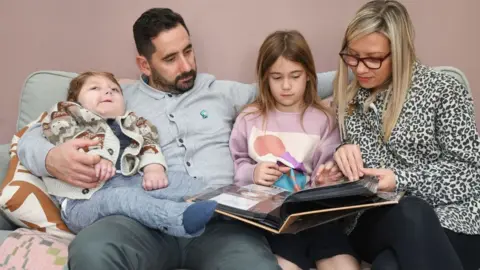 Acorns Hospice
Acorns HospiceParents of a little boy who touched the hearts of millions when he appeared as an England mascot shortly before dying from a brain tumour say their second son has a life-limiting condition.
Ben Williams, from Birmingham, was described as an "inspiration" by Harry Kane before he died aged six in 2019.
A year later his parents gave birth to Reuben but found he had a rare genetic condition and needed end of life care.
The family is being cared for by Acorns Children's Hospice for a second time.
Speaking as they helped the charity launch its Christmas fundraising appeal, Ben and Reuben's father Sam Williams said the hospice had been a lifeline.
"I genuinely don't know what we would have done without Acorns," he said.
"The shock of a second child who was so profoundly poorly. I don't know whether Jo and I would have survived that."
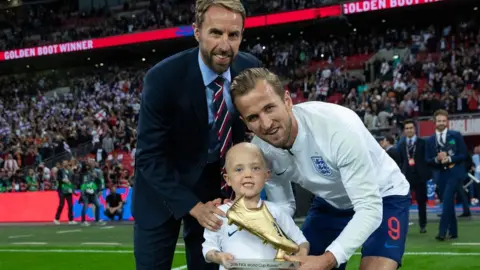 Brain Tumour Research
Brain Tumour ResearchThe family's story caught attention when a video of football-mad Ben being given a replica World Cup in 2018 while he was in hospital went viral.
As the hashtag #BensWorldCup trended on Twitter, it caught the attention of England captain Kane and within weeks Ben appeared as a mascot at Wembley Stadium in their match against Spain.
The whirlwind experience was welcome relief for the family.
"It felt like a film, and we were characters being swept along," his mum Jo said.
"It was a bit like we were the England team, Ben was the underdog, defying expectations.
"We thought 'he's going to turn this around'."
Devastatingly, Ben's condition deteriorated over the next few months and the family decided to take him to Acorns in Selly Oak, for his final days.
In their darkest hours, the hospice allowed them to make the most of every last moment.
"I don't know what we would have done without that service," Mr Williams said.
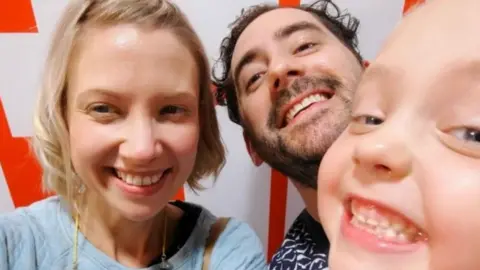 Brain Tumour Research
Brain Tumour ResearchIn March 2020, the couple, who have a daughter Lydia, were thrilled to welcome "perfect little boy" Reuben.
But they soon noticed he was having problems feeding, before one day he was rushed to A&E after a seizure.
At Birmingham's Children's Hospital they ended up in the same cubicle where Ben had been for treatment.
Reuben was diagnosed with epileptic encephalopathy, a rare genetic condition completely unrelated to his brother's glioblastoma.
"It's at this point we're being told that we have a life-limited child," Mr Williams said.
"For us to hear that a second time, it just floored us."
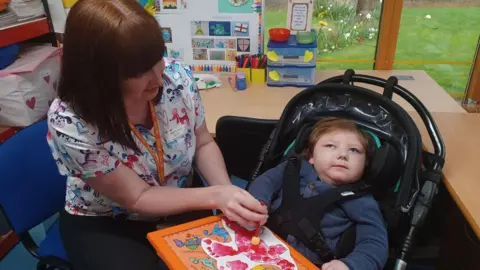 Acorns Hospice
Acorns HospiceNow aged three he has highly complex needs and requires continuous care, as he has been left unable to walk and talk.
His condition has stabilised, however, and he visits the hospice regularly for short breaks, allowing his parents to focus on Lydia, seven.
"It's like an extension of the family, when Reuben goes into respite, we say, you're going to stay with your aunties and uncles," Mr Williams explained.
"The nurses there, the way they look after Reuben is just beautiful."
Mrs Williams said the hospice, which also has bases in Walsall and Worcester, was "always at the end of the phone" anytime she had felt things were "overwhelming."
She described it as the "difference between sinking or swimming."
"It's a place where I know I can talk about anything," she added.
"I can talk about Ben, I can say Ben's name and nobody looks awkward, it's like a little bubble.
"That's not always the case in the outside world."
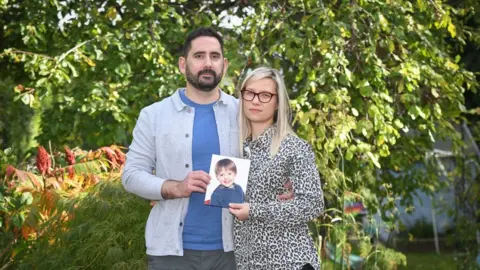 Acorns Hospic
Acorns HospicMr Williams said the family could not have endured the last few years without the support of the children's hospice, which supports families across the West Midlands, Shropshire and Staffordshire.
"I can't believe there are places still around the country that don't have access to organisations like that," he said.
"Genuinely, it's beyond my belief, I don't know how anyone would cope."
The family is helping Acorns launch their "Stronger Together at Christmas" appeal, and said the charity's work could not be overstated.
I never thought we'd have to go back there again and use them again," Mr Williams said.
"For an organisation that deals ostensibly with dying, the amount of lives that Acorns saves probably goes under the radar - they literally save lives," said Mr Williams.
"That's probably, ultimately, its biggest power."

Follow BBC West Midlands on Facebook, X and Instagram. Send your story ideas to: [email protected]
